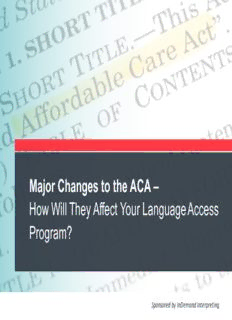
ebook-InDemand-Interpreting-Major-changes-to-the-ACA-Part1 PDF
Preview ebook-InDemand-Interpreting-Major-changes-to-the-ACA-Part1
Major Changes to the ACA – How Will They Affect Your Language Access Program? Sponsored by InDemand Interpreting Major Changes to the ACA E-book Series: PART 1: What Are the New Regulations? PART 2: How to Comply With the New Regulations? PART 3: Leveraging Technologies as Part of Your Compliance Strategy Major Changes to the ACA – How Will They Affect Your Language Access Program? PART 1: What are the New Regulations? AUTHORED BY: David B. Hunt, J.D. - President and CEO, Critical Measures Sponsored by InDemand Interpreting This e-book will cover: 1. Understand the new ACA anti-discrimination regulations. 2. Understand how these regulations will impact your language access program 3. Understand how the new regulations will promote the use of qualified medical interpreters and translators and substantially restrict the use of unqualified interpreters (such as untrained bilingual staff, adult family members, friends and minor children) Sponsored by InDemand Interpreting Overview of Federal Language Access Laws SSppoonnssoorreedd bbyy IInnDDeemmaanndd IInntteerrpprreettiinngg MAJOR CHANGES TO THE ACA Title VI of the Civil Rights Act of 1964 • Prevents federal money from being used to support programs that discriminate on the basis of race, color or national origin. • Providers covered by Title VI if they receive federal funds (Medicare, Medicaid, etc.) Exception: Medicare Part B clinics • Requires providers to take “reasonable steps” to provide “meaningful access” to federal health programs. • U.S. citizenship not required. (“Persons” vs citizens) • Failure to provide free language access to LEP regarded as national origin discrimination. Lau v. Nichols, (U.S. 1974) • No private right to sue for language access violations. (Alexander v. Sandoval, (U.S. 2001, Scalia) • Right to select method of language assistance belongs to M.D. Sponsored by InDemand Interpreting MAJOR CHANGES TO THE ACA Americans With Disabilities Act (ADA) • Section 504 of the Rehabilitation Act of 1973 requires recipients of federal financial aid to be equally accessible to handicapped persons. Duty to ensure “effective communication” if 15+ ees. • Titles II and III of the Americans with Disabilities Act prohibit discrimination against persons with disabilities in places of public accommodation. (No employer size limit.) • Both of these laws harmonized by the ADA Amendments Act (ADAAA,2008). • Exceptions: must accommodate unless “undue burden” or “fundamental alteration of program”. (Note: Fogari decision) • Private cause of action allowed (unlike Title VI). • Legal duty extends beyond patient. • Providers have discretion but “primary consideration” should be given to patient’s preferred method of accommodation. (Title II standard is higher than Title III) Sponsored by InDemand Interpreting MAJOR CHANGES TO THE ACA Section 1557 of the Affordable Care Act (ACA) • Section 1557 of the ACA prohibits discrimination on the basis of race, color, national origin, sex, disability and age by: – Any health program/activity that receives federal funding – Includes health insurance marketplaces and all plans offered by issuers that participate in those marketplaces • First federal civil rights law to prohibit sex discrimination in health care. (Impacts LGBTQ, sexual identity, transgendered) • Excludes Medicare Part B providers. No employer size restriction. • Final rule little different from proposed rule in content. • Gives LEP private right to sue under ACA (not Title VI) • Creates major changes in the law of language access • Effective date: July 18, 2016. (Except for health plans…January 1, 2017) Sponsored by InDemand Interpreting MAJOR CHANGES TO THE ACA Enforcement of the New ACA Regulations • Enforcement mechanisms under Title VI, Title IX, the Age Act and Section 504 apply to violations of Section 1557 • Enforcement agency: OCR (not DOJ). OCR authorized to conduct compliance reviews and complaint investigations as well as to provide technical assistance and guidance. OCR may consider conducting unannounced onsite compliance reviews • Covered entities required to keep records, submit compliance reports to OCR, name a designated official to be responsible for compliance. • Noncompliance could result in suspension of, termination or of refusal to grant or continue Federal financial assistance or a referral to DOJ with recommendation to bring legal proceedings. • Private right of action and compensatory damages are available for violations of Section 1557 regulations. Note applicability of Civil Rights Attorney’s Fees Act of 1976. • Violations by one hospital in a system may occasion remedial action by the entire system. Sponsored by InDemand Interpreting Final Rules Are Federal Regulations Not “Guidance” Sponsored by InDemand Interpreting
Description: